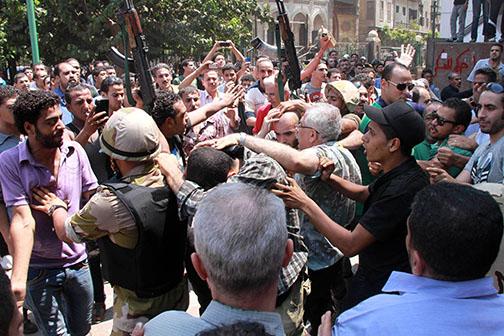San Diego State’s Center for Islamic and Arabic Studies held a four-professor panel Tuesday evening about the turmoil in Egypt inside a packed lecture hall.
Professors Farid Abdel-Nour, Hisham Foad, Ahmet Kuru, and Ghada Osman gave presentations on the various aspects of the political conflict in Egypt.
Though they mentioned many different factions during their presentations, the main focus of the panel was placed on the relationship between the Muslim Brotherhood and the Egyptian military.
Osman, who is a linguistics professor, said the Muslim Brotherhood and the Egyptian military have been rivals since the Egyptian military took power in 1952 and marginalized the political voice of the Brotherhood.
[quote]I think Egyptians have a deeper understanding of democracy than most Americans. They know what is at stake.[/quote]
“The killing of any number of Egyptians, no matter what side, is sickening,” linguistics senior and panel attendee Hasan Autman said.
Political science professor Abdel-Nour then detailed how a series of faulty elections and a lack of a constitution led to an overrepresented Brotherhood in control of the legislature and presidency. In response, the military and the country’s bureaucracy opposed them at every turn. This competition for power led President Mohamed Morsi to attempt to gain control of as many branches of the government as possible, scaring Egyptians, who then began protesting again. This lead to the dissolving of the Brotherhood-run government by the military.
Abdel-Nour took the opportunity to address the viewpoint that the recent military takeover of the Egyptian government was simply democratic buyer’s remorse.
“I think Egyptians have a deeper understanding of democracy than most Americans,” Abdel-Nour said. “They know what is at stake.”
The Brotherhood’s main problem is that its leaders are mostly doctors and engineers, not social scientists, Kuru, who is a political science professor, said. Their botched attempt at governance might have permanently marginalized them in Egyptian minds.
To make matters worse for Egyptians, this period of political instability has completely decimated the already fragile Egyptian economy said Foad, who is a professor of economics. Under the current conditions Egypt is almost completely reliant on foreign aid.
All four professors expressed worry that the current interim military government is similar to former President Hosni Mubarak’s military-led regime. Abdel-Nour and Kuru said many of the current judges and members of the military, who are currently leading the Egyptians, also served under Mubarak.
During the panel, a student asked when the professors thought Egypt would become stable again. Kuru predicted it would happen within the next 10 years, though the other professors were somewhat more optimistic.
“If the interim government hadn’t started to brand Muslim Brotherhood members as terrorists I would say much sooner,” Abdel-Nour said. “This terrorist rhetoric is a point for concern.”










